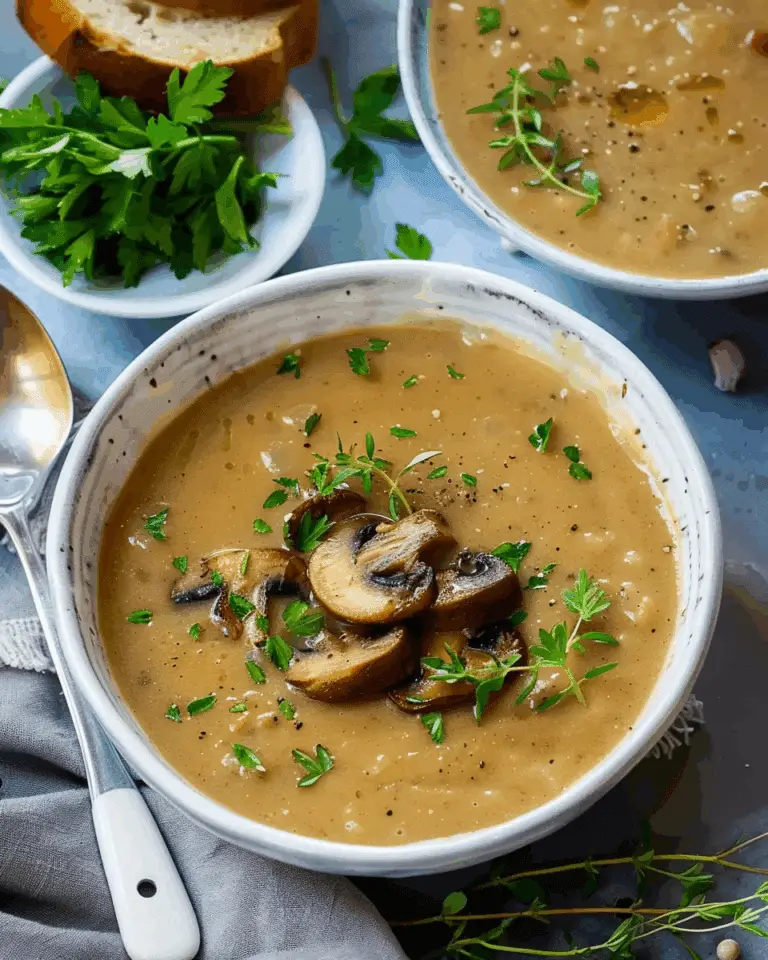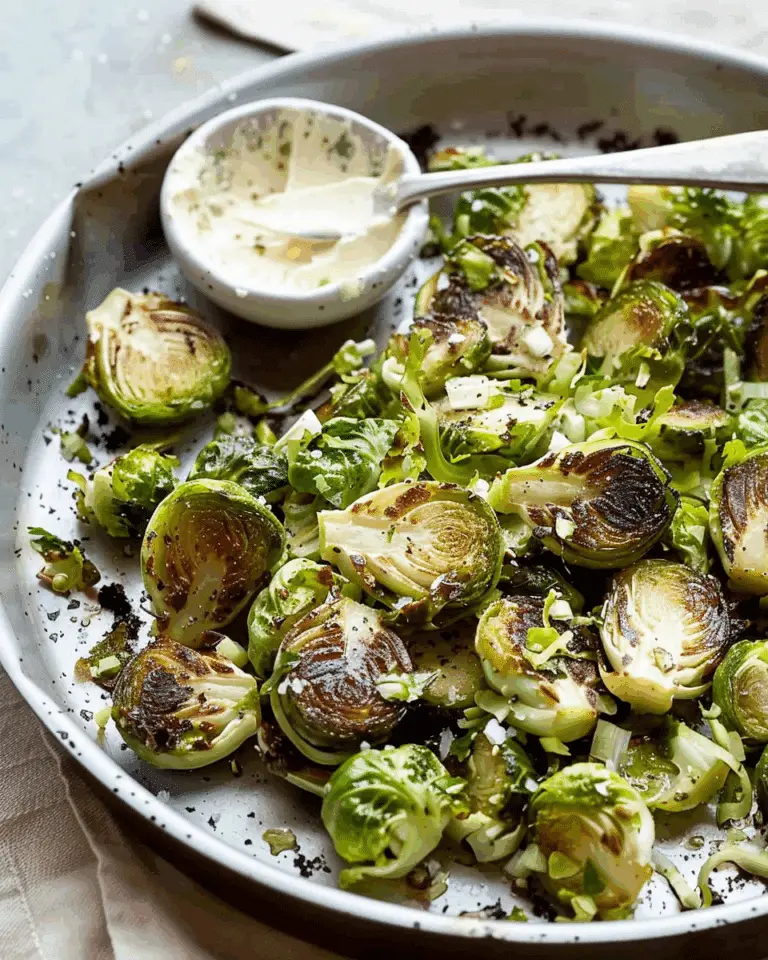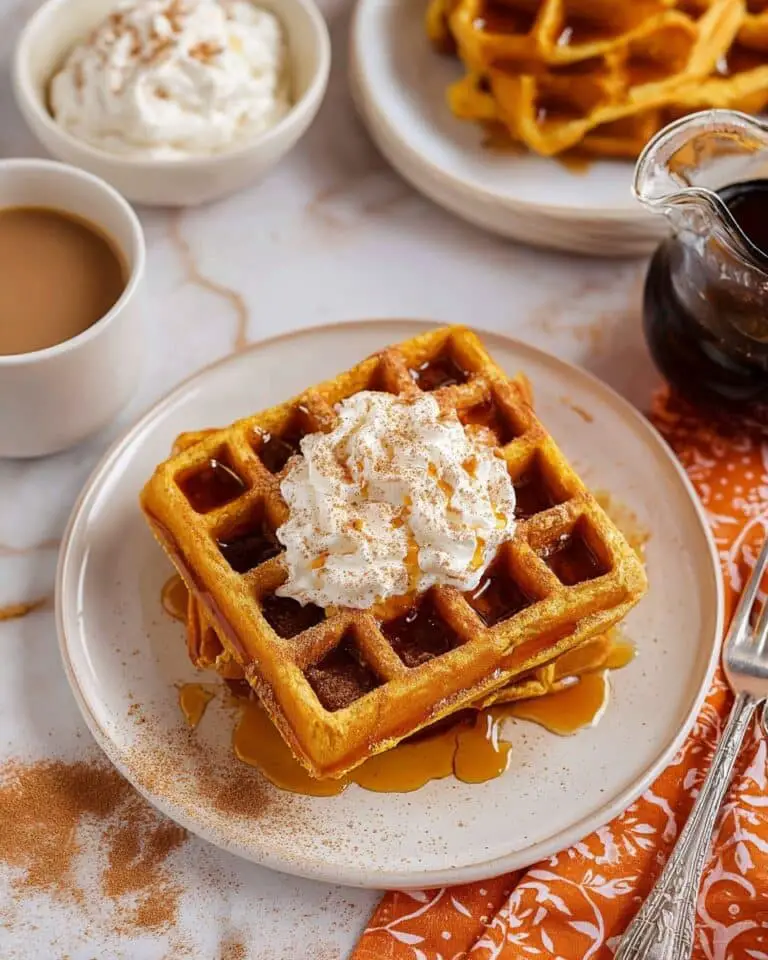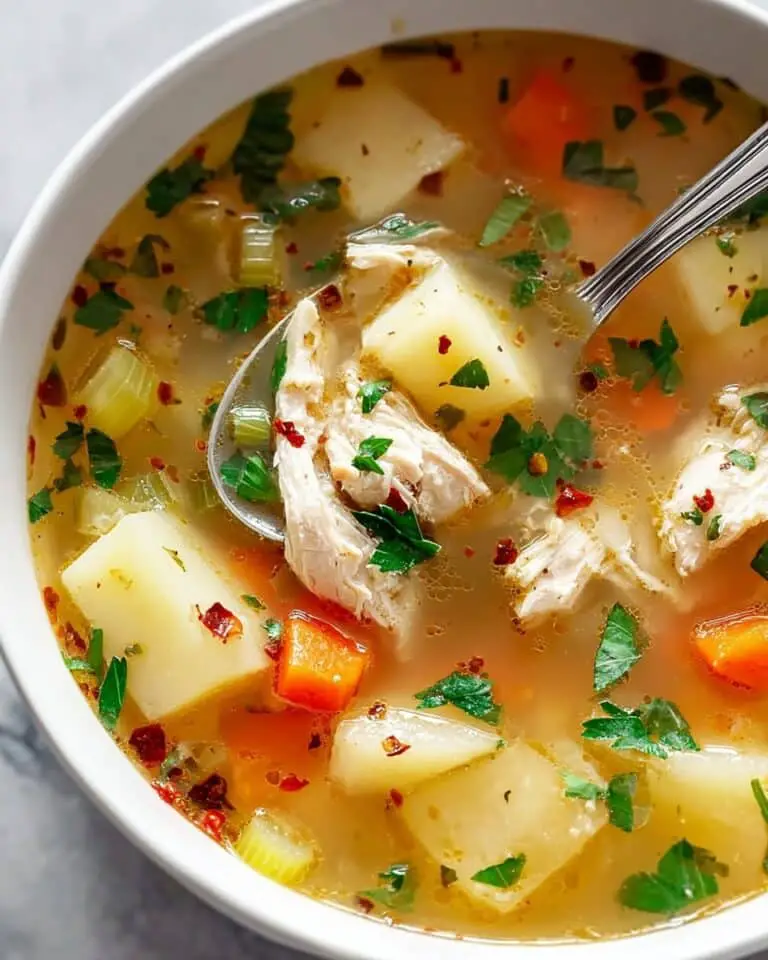If you’ve ever thought gluten-free bread couldn’t be deliciously soft, tender, and packed with flavor, wait until you try this Gluten-Free Focaccia with Rosemary Recipe. It’s a warm hug in bread form, boasting a wonderfully light crumb and that irresistible golden crust studded generously with fresh rosemary, flaky sea salt, and just the right touch of Parmesan. Whether you’re living gluten-free or just craving a cozy homemade bread that pairs perfectly with just about any meal, this recipe will quickly become one of your favorites—and I’m thrilled to share it with you!
Ingredients You’ll Need
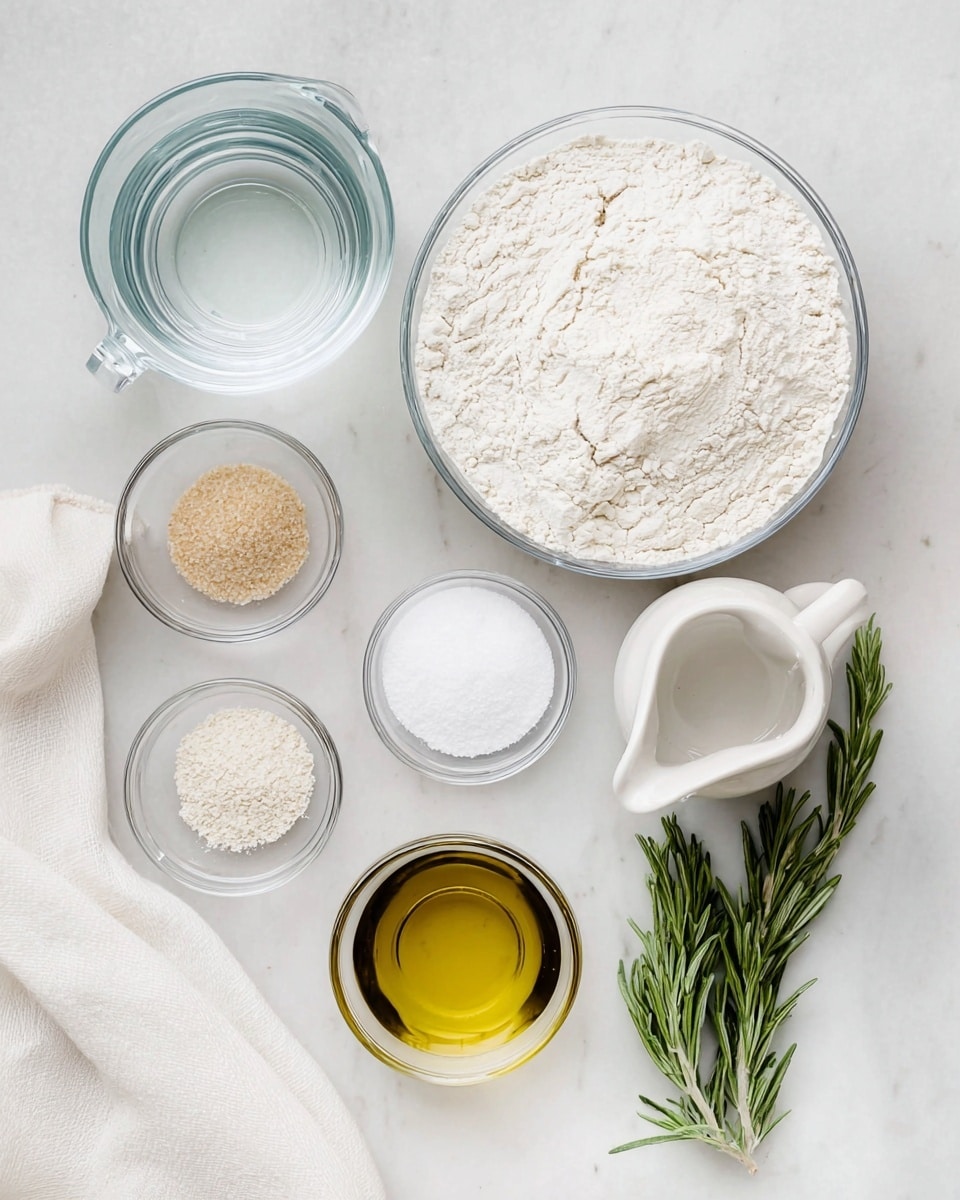
This recipe shines with a handful of simple, thoughtfully chosen ingredients that come together to create the perfect balance of texture and taste. Each one plays a crucial role—flour for structure and softness, yeast for that classic rise, olive oil for richness, and rosemary for aroma and flavor.
- 2 1/2 cups gluten free 1:1 flour: I highly recommend King Arthur Flour Measure-for-Measure flour for the best texture and rise.
- 2 teaspoons baking powder: Helps add extra lift for that fluffy crumb.
- 1 1/2 cups warm water (120-130°F): Perfect warmth to bloom the yeast without killing it.
- 1 1/4 oz. instant or rapid rise yeast (2 1/4 teaspoons): Gives the focaccia its light, airy texture.
- 1 tablespoon sugar, honey, or agave: Feeds the yeast and adds a subtle hint of sweetness.
- 1 teaspoon kosher salt: Balances flavors and enhances the savory notes.
- 4 tablespoons olive oil, divided: Adds richness and helps create a moist crust.
- 1 tablespoon fresh rosemary: Imparts that unmistakable piney, herbal aroma.
- 1-2 tablespoons vegan or regular Parmesan cheese: Optional, but brings a beautiful umami boost.
- 1/2 teaspoon flaky sea salt (like Maldon): Crystals add delightful bursts of saltiness.
- 1/4 teaspoon black pepper: Gives a little gentle warmth on the finish.
How to Make Gluten-Free Focaccia with Rosemary Recipe
Step 1: Combine Dry Ingredients
Start by whisking together your gluten-free flour, kosher salt, and baking powder in a large mixing bowl. This dry mix forms the base that will carry all those beautiful flavors and deliver structure to your focaccia.
Step 2: Warm the Water and Bloom the Yeast
Gently warm the water to about 120-130 degrees Fahrenheit—use your finger to make sure it’s pleasantly warm, not hot. Stir in your yeast and the sweetener of choice, then let it rest for 3 to 5 minutes until it becomes foamy on top. This “blooming” step ensures your yeast is active and ready to work its magic.
Step 3: Combine Wet and Dry Ingredients
Pour 2 tablespoons of olive oil and the yeast mixture into the bowl with the dry ingredients. Stir everything together gently—the mixture will be more like a batter than traditional dough, so no kneading here. This texture is key to keeping your gluten-free focaccia perfectly light.
Step 4: Transfer to Pan and Set to Rise
Line your baking pan (8×8 or 9×9 inches) with parchment paper and drizzle 2 to 3 tablespoons of olive oil over it. Carefully spread or pat the batter into the pan—dipping your fingertips in olive oil makes this easier and keeps your hands from sticking. Drizzle an extra tablespoon of olive oil over the top before covering it with plastic wrap or a clean towel. Let the dough rise in a warm spot until it roughly doubles in size—about 30 minutes if you use rapid-rise yeast or closer to an hour otherwise.
Step 5: Preheat Oven and Prepare Dough
As your dough rises, preheat your oven to 400 degrees Fahrenheit. Once risen, coat your fingertips with olive oil and gently dimple the dough surface by poking even holes all over—the classic focaccia signature. A little olive oil drizzle before dimpling helps create that tender crust and makes the process easier.
Step 6: Add Toppings and Bake
Sprinkle fresh rosemary, your choice of Parmesan or vegan alternative, flaky sea salt, and pepper evenly over the dough. Bake in the preheated oven for 25 to 30 minutes until the top is a gorgeous golden brown. Let it cool for 10 to 12 minutes before slicing so all those flavors settle perfectly.
How to Serve Gluten-Free Focaccia with Rosemary Recipe
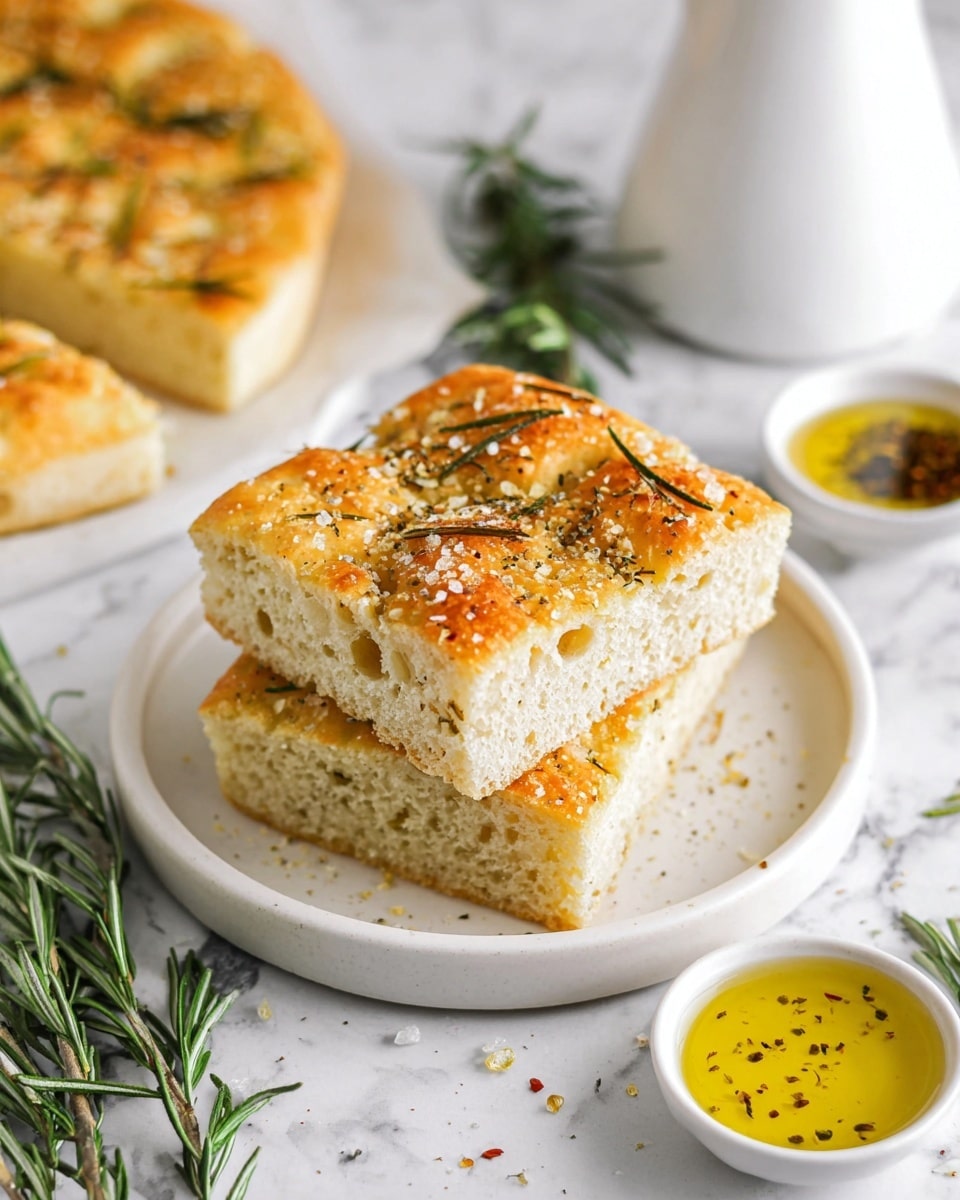
Garnishes
A sprinkle of extra flaky sea salt just before serving will elevate your focaccia even further, bringing delightful bursts of saltiness with every bite. Fresh rosemary sprigs can add an inviting aroma and make your focaccia look irresistible at the table.
Side Dishes
This focaccia pairs beautifully alongside warm soups, hearty salads, or your favorite pasta dishes. It’s also wonderful with a spread of olive tapenade or stuffed olives for an appetizer or snack time treat.
Creative Ways to Present
Try cutting the focaccia into thick squares or strips for dipping into olive oil infused with garlic and herbs. You can also top individual slices with ripe tomatoes, burrata, or slices of fresh mozzarella and a drizzle of balsamic glaze to transform it into a quick bruschetta-style snack.
Make Ahead and Storage
Storing Leftovers
Store any leftover focaccia in an airtight container at room temperature for 2-3 days. It stays deliciously soft and flavorful, ready to enjoy as a quick snack or with your next meal.
Freezing
Wrap focaccia tightly in plastic wrap and place it inside a freezer-safe bag or container. It freezes wonderfully for up to 2 months, so you can always have this delightful bread ready whenever you want.
Reheating
For the best texture, reheat frozen or leftover focaccia in a 350-degree oven for about 10 minutes. This crisp is back! Alternatively, a quick warm-up in a toaster oven works well, making it easy to enjoy that fresh-baked taste any time.
FAQs
Can I make this Gluten-Free Focaccia with Rosemary Recipe vegan?
Absolutely! The recipe is naturally vegan except for the Parmesan cheese topping, which you can easily swap for a vegan Parmesan or simply omit. Olive oil adds plenty of richness on its own.
What if I don’t have King Arthur Measure-for-Measure flour?
King Arthur Measure-for-Measure flour gives the best rise and texture, but you can use other gluten-free 1:1 blends like Bob’s Red Mill. Just be aware that some blends might produce a slightly denser or less browned focaccia.
How important is the water temperature when blooming the yeast?
It’s quite important because water that’s too hot will kill the yeast, and too cold won’t activate it properly. Aim for warm, comfortable water you can hold your finger in for a few seconds—around 120-130°F is ideal.
Can I use fresh rosemary from my garden?
Definitely! Fresh rosemary makes all the difference with its bright herbal notes. Just make sure it’s rinsed and dried before sprinkling it on top.
Is this focaccia suitable for people with nut allergies?
Yes, this recipe contains no nuts and is safe for anyone avoiding nuts. Just check that your gluten-free flour blend and toppings are nut-free as well.
Final Thoughts
There is something truly joyful about coming home to the comforting scent of freshly baked bread, especially when it’s a Gluten-Free Focaccia with Rosemary Recipe that satisfies every craving for soft, flavorful bread without gluten. Whether you want a new staple for your weeknight dinners or a delightful centerpiece for your next gathering, this focaccia is sure to win hearts. Give it a try—you might just find your new favorite gluten-free treat!
Print
Gluten-Free Focaccia with Rosemary Recipe
- Total Time: 40 minutes (excluding rising time)
- Yield: 9 to 12 slices
- Diet: Gluten Free
Description
This Gluten-Free Focaccia with Rosemary is a soft, flavorful Italian-style bread perfect for those avoiding gluten. Made with a blend of gluten-free flours and topped with fresh rosemary, flaky sea salt, and parmesan or vegan parmesan, this focaccia is easy to prepare and bake, boasting a golden crust and tender crumb. Ideal as a side dish or for dipping, it’s a delightful addition to any meal.
Ingredients
For Gluten Free Focaccia:
- 2 1/2 cups (300 grams) gluten free 1:1 flour (King Arthur Flour Measure-for-Measure recommended)
- 2 teaspoons baking powder
- 1 1/2 cups warm water (120–130 degrees F)
- 1 1/4 oz. package instant or rapid rise yeast (2 1/4 teaspoons)
- 1 Tablespoon sugar, honey, or agave
- 1 teaspoon kosher salt
- 4 Tablespoons olive oil, divided
For Topping:
- 1 Tablespoon fresh rosemary
- 1–2 Tablespoons vegan parmesan or Parmesan cheese
- 1/2 teaspoon flaky sea salt (like Maldon)
- 1/4 teaspoon black pepper
Instructions
- Combine Dry Ingredients: In a large mixing bowl, whisk together the gluten free flour, kosher salt, and baking powder until well incorporated. Set aside.
- Warm The Water: Heat the water either in a microwave or on the stovetop until it reaches about 120-130 degrees Fahrenheit, warm enough to be comfortably touched without burning your finger.
- Bloom The Yeast: Stir the yeast and the sugar (or honey/agave) into the warm water, then set the mixture aside for 3-5 minutes until it becomes foamy, indicating the yeast is active.
- Combine Wet and Dry Ingredients: Pour 2 tablespoons of olive oil and the yeast-water mixture into the flour mixture. Stir well until combined; expect a batter-like consistency rather than traditional dough, no kneading needed.
- Transfer To The Pan: Line an 8×8 or 9×9 inch metal baking pan with parchment paper. Drizzle 2-3 tablespoons olive oil over the parchment. Gently transfer the focaccia batter into the pan and spread it evenly by patting it with oiled fingertips or a spatula. Drizzle the top with 1 additional tablespoon olive oil.
- Let The Dough Rise: Cover the pan with plastic wrap or a clean dish towel and place it in a warm spot to rise. Allow about 30 minutes if using rapid rise yeast or about an hour if using regular yeast. The batter should roughly double in size.
- Preheat The Oven: In the last 20 minutes of rising, preheat the oven to 400 degrees Fahrenheit.
- Dimple The Dough: Lightly oil your fingertips and gently press to create the characteristic focaccia dimples all over the surface of the dough, being careful not to deflate it.
- Add Toppings: Sprinkle fresh rosemary, parmesan or vegan parmesan cheese, flaky sea salt, and black pepper evenly over the top of the dough.
- Bake: Bake in the preheated oven at 400°F for 25-30 minutes, or until the focaccia is golden brown on top.
- Cool and Serve: Remove from the oven and let the focaccia cool for at least 10-12 minutes before slicing. Store leftovers in an airtight container at room temperature for 2-3 days or freeze up to 2 months.
Notes
- Choose the right gluten-free flour; King Arthur Flour Measure-for-Measure is highly recommended for the best texture and browning. Bob’s Red Mill 1:1 flour is a secondary option but may yield a less light and less done center.
- For a great dipping sauce, mix 1/3 cup olive oil with granulated garlic, coarse salt, pepper, red pepper flakes, and herbs like rosemary, oregano, or basil. A suggested combo includes 1/4 tsp dried flaked garlic, 1/2 tsp fresh rosemary, 1/4 tsp oregano, 1/4 tsp coarse salt, 1/4 tsp black pepper, and 1/4 tsp red pepper flakes.
- For a thinner focaccia with a more organic shape, let the dough rise in the mixing bowl, then transfer to an oiled baking sheet and shape into an 8×10 rectangle before topping and baking.
- Prep Time: 15 minutes
- Cook Time: 25 minutes
- Category: Side Dish
- Method: Baking
- Cuisine: Italian

